Alastair Cook: How did we get here? Why might he stay as England captain?
- Published
- comments
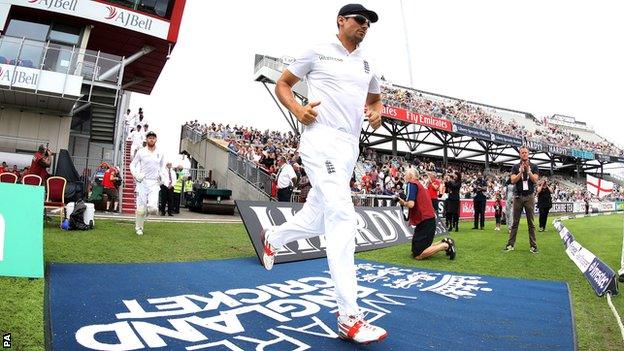
Alastair Cook was appointed England captain in 2012
What seemed to be a certainty is now not so sure.
All of the noises, particularly from the man himself, pointed towards Alastair Cook ending his 59-Test reign as England captain.
But Thursday's news that Cook will be given as much time as he needs to decide on his future hints at a greater possibility he will remain in charge.
What might persuade him to stay? What might more Cook mean for the England side? And what happens if it goes wrong?
How did we get here?
Through a combination of Cook's words and demeanour on a thoroughly miserable winter tour of India.
Even before the start he admitted he was looking forward to not being captain, going on say he had "questions" over his future and he needed time to think about his position.
That Cook may be tired of the rigours of captaincy is no surprise, he is over four years into a job that no-one has managed to do for more than five since 1961.
And, during a gruelling schedule of seven back-to-back Tests in Bangladesh and India, he cut an increasingly gloomy figure, especially after England lost the final two matches by an innings despite posting first-innings totals in excess of 400.
"When you have presided over something so cataclysmic in sporting terms as that, then it is only natural that Cook may be thinking differently about his future as captain," said BBC cricket correspondent Jonathan Agnew after England lost the fifth Test in Chennai.
All of this suggested Cook would call time on his tenure in his regular post-series review with England director of cricket Andrew Strauss, his good friend and former opening partner.
That meeting takes place on Friday, but we now know Cook's future will not be decided.
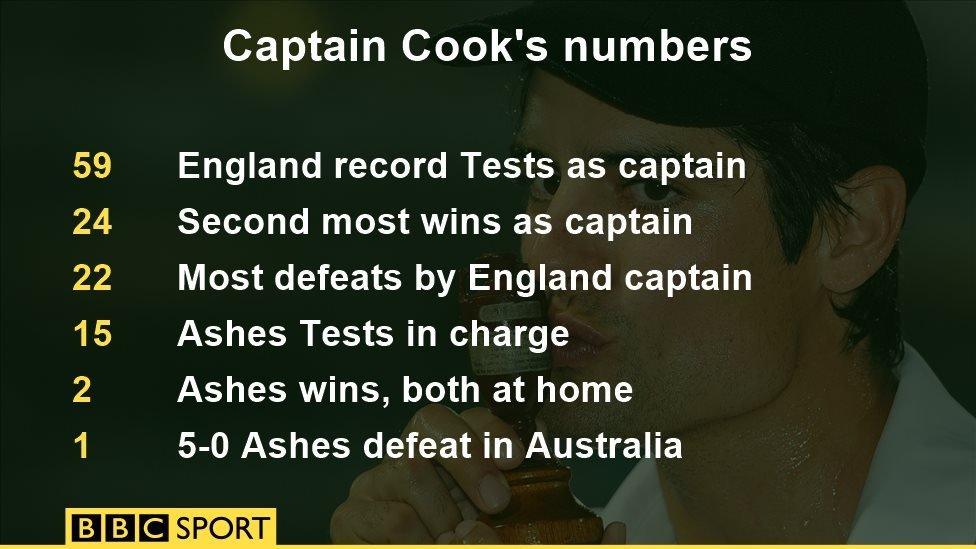
So what's changed?
Time may just heal all wounds.
Cook has been close to quitting before, only to be talked out of jumping ship by his wife Alice. It could be that a Christmas at home and discussions with his closest confidant have pushed the 32-year-old in the direction of staying.
"They really are a team," said Agnew of Cook and his wife. "The time he is taking means that Cook is making the right decision for him. He will be incredibly comfortable with what lies ahead."
The opener, England's record Test runscorer, is approaching this decision very much in the way he constructs an innings. Patiently, meticulously, playing a shot only when absolutely certain.
There was no throwing in the towel after the chaotic fifth Test loss or rushing into a meeting with Strauss at the earliest opportunity. Even now he has indicated he would like more time.
All of that suits the England management, who feel there is no rush for an answer on the captaincy with the next Test not until July.
England coach Trevor Bayliss said last month he would be "disappointed" if Cook did not remain as skipper.
It may be the longer he waits to give an answer, the more likely Cook is to stay on.
Why might he stay?
Cook has been on the brink before, most notably the summer of 2014. Whereas then he was pushed to the edge by a combination of patchy form and poor results, here he has voluntarily walked to the precipice.
Back then, Cook repeatedly reiterated he would not quit and that it would be for someone else to take the job away from him - that sense of duty may not yet have been eroded away.
"He's stubborn and mentally very tough," said former England captain Michael Vaughan. "He's been through this sort of spell two or three times in his captaincy and carried on."
He also retains, publically at least, the support of the England management and staff. Not only has Bayliss spoken out in support of the skipper, but so too have assistant coach Paul Farbrace, all-rounder Ben Stokes, wicketkeeper Jonny Bairstow and opener Haseeb Hameed.
More importantly, there is a huge, Ashes-shaped temptation on the horizon.
Cook, so bruised by the 5-0 whitewash he presided over in 2013-14, may not be able to resist the chance for revenge on an Australia side England should be mildly optimistic about facing.
Would staying on be a good idea?
There is a school of thought that a captain is halfway out of the door the moment he considers quitting. Vaughan says even 1% of doubt is enough for a skipper to stand aside.
Cook, having come close to resigning before, flies in the face of this theory.
That doesn't necessarily mean he would be right to remain, especially when he has just overseen eight defeats in 2016, the joint-highest for England in a calendar year.
The main case for Cook staying in charge centres around continuity at the beginning of an Ashes year, and that a near seven-month break from Test cricket should provide a refreshed outlook on the job.
There is also a paucity of options to replace Cook, with some feeling captain-in-waiting Joe Root, England's best batsman, should not yet be burdened with the responsibility of captaincy.
"Root is the outstanding candidate, but you wouldn't want it to be a case of making your best player captain, only for it to backfire on you later," said former England off-spinner Graeme Swann.
"I'm still not convinced Root is the right man for the job. I want him to concentrate on being the best player we have ever had, rather than having his talent curbed by the pressures of captaincy.
"He has tried to be more sensible later, but part of his cheeky chappy persona makes him the player he is, and I don't want to see that taken away."
What could go wrong?
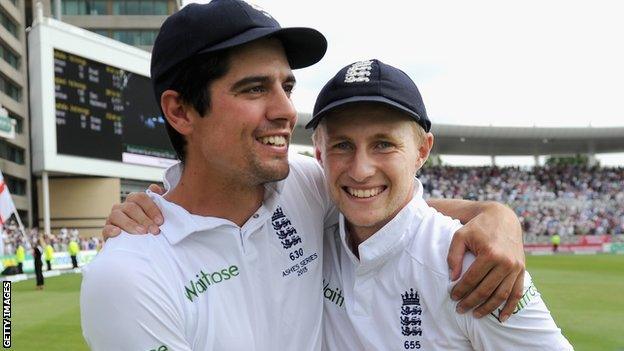
Joe Root was appointed as Cook's vice-captain in 2015
If Cook does remain, England will want him to commit to leading them down under, rather than dropping an inexperienced new captain into the job for the toughest and most high-profile of tours.
For that to happen, both his own form and the results of the England team must be solid throughout the home summer to prevent the issue of the captaincy rearing its head once again.
It is not difficult to imagine a scenario where England start badly in the series against South Africa, Cook struggles for runs, and pressure is heaped upon the captain. After all, the past three visits by the Proteas have resulted in an England skipper resigning.
"If we are to have a new captain, he needs all seven home Tests this summer to get his feet under the table," said former England batsman Geoffrey Boycott.
"We don't want Alastair giving it up after three or four Tests, before the biggest series of all.
"If it is going to be Root - which it will be - he needs seven Test matches to put his stamp on it. Players need to get with his style."
What happens next?
We wait.
In recent times, the England and Wales Cricket Board hasn't always been airtight. Information has leaked like a broken tap.
This, though, is likely to be different. Cook is a fiercely private man. Few other than his wife and Strauss may really know what his intention is.
Whatever his decision, the story does not end there. If he stays, he will be under the microscope. If he goes, the heat shifts to Root.
The consequences will not fully be revealed until 8 January 2018, the Sydney Cricket Ground and the end of the Ashes.
- Published12 January 2017
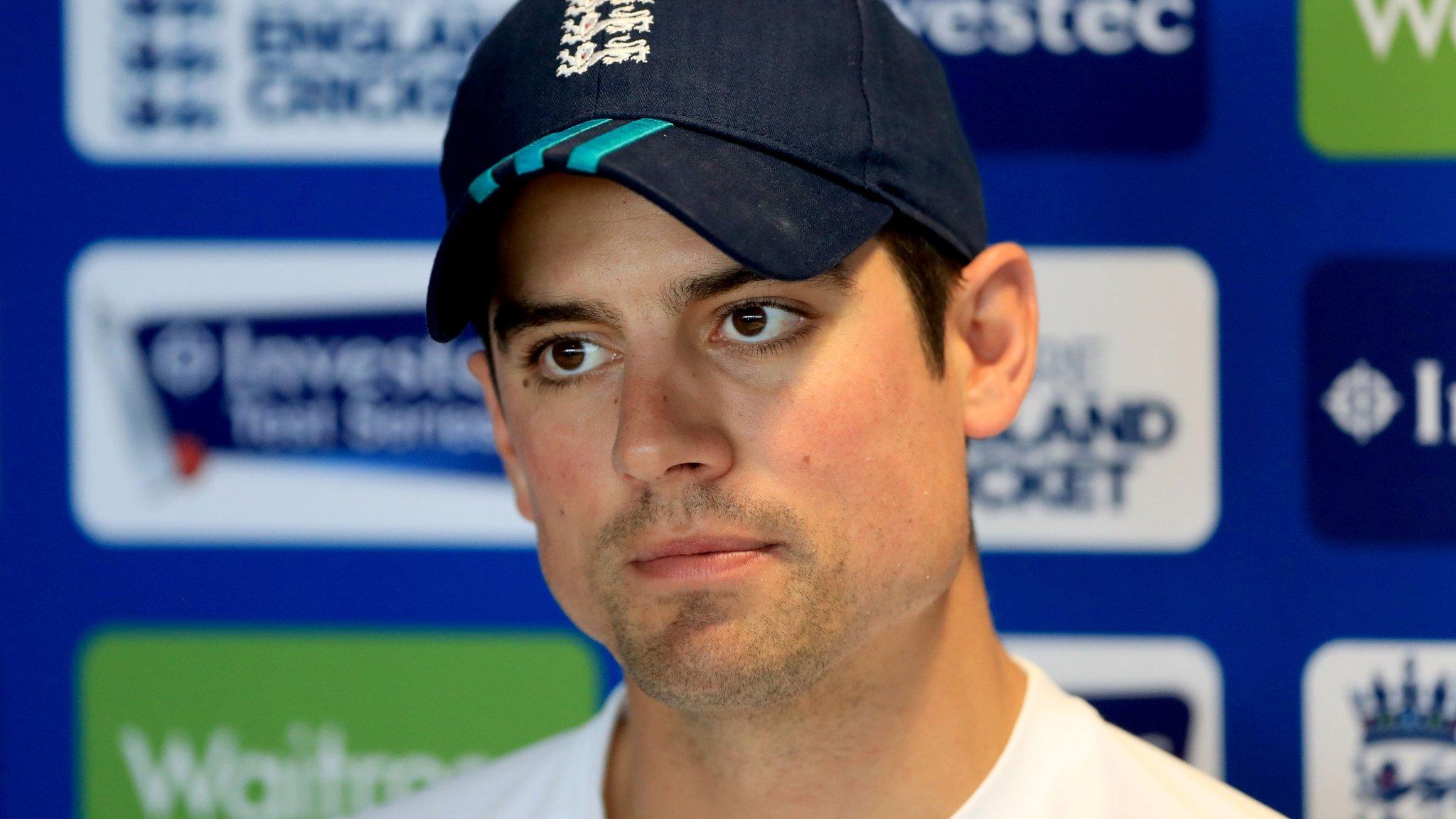
- Published12 January 2017
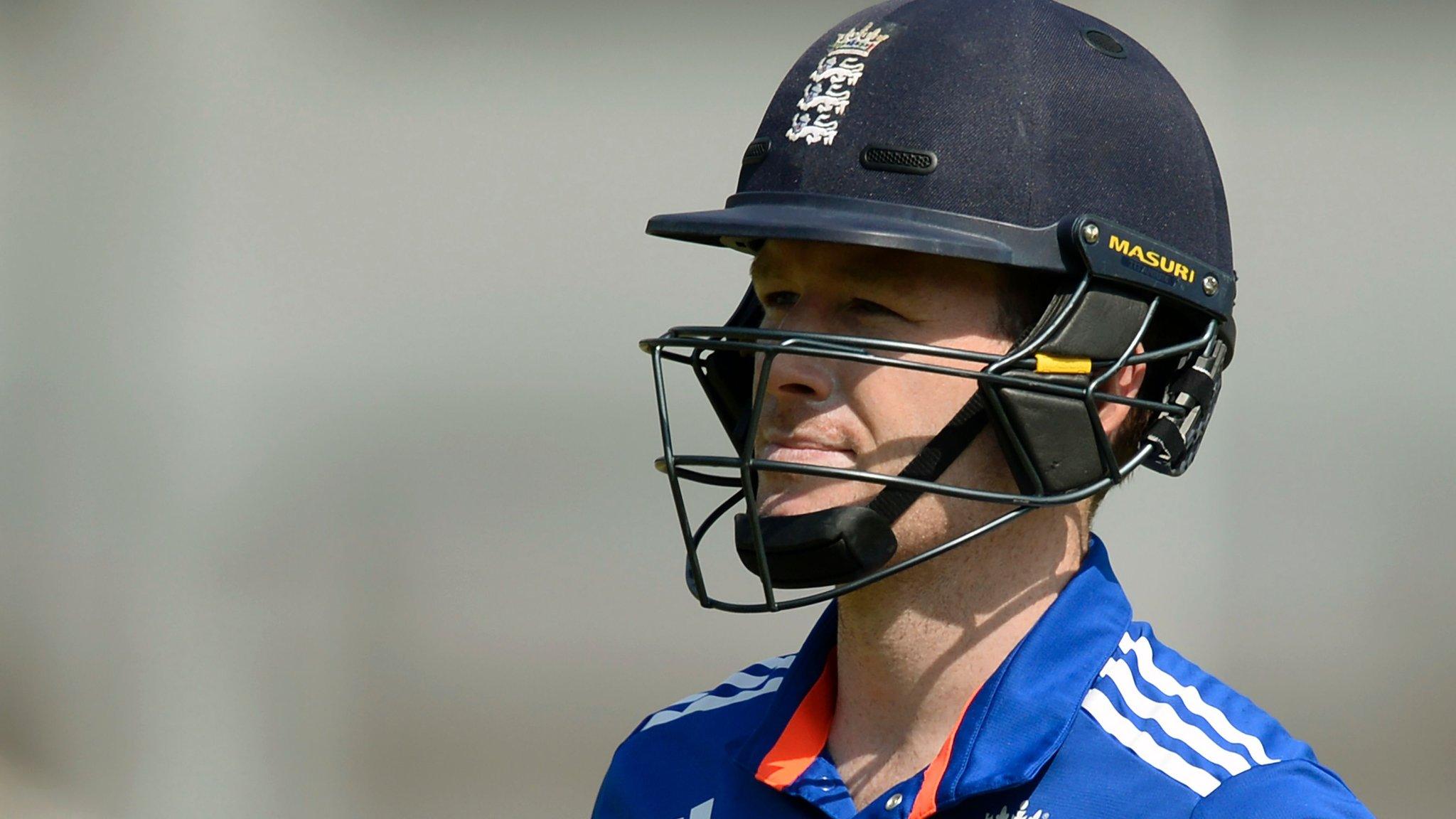
- Published12 January 2017
